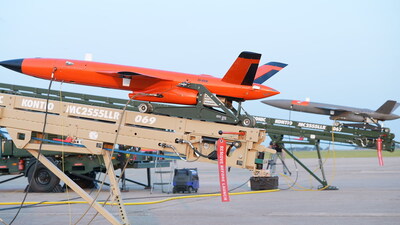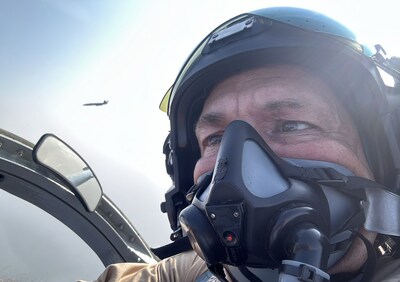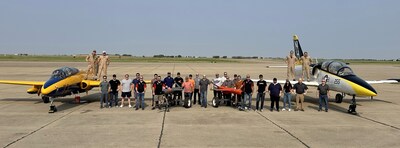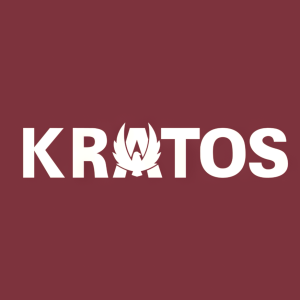Shield AI Achieves Groundbreaking Collaborative Multi-Jet Aircraft Autonomy in Kratos MQM-178 Firejet Flight Test Event
Rhea-AI Summary
Shield AI has achieved a significant milestone in autonomous aircraft technology by successfully demonstrating multi-jet autonomy flights using two Kratos MQM-178 Firejets. The test featured two autonomous agents piloted by Shield AI's 'Hivemind' AI Pilot, showcasing coordinated maneuvers and operationally relevant collaborative behaviors. This advancement highlights the potential for future unmanned jets and drones with on-board computing and seamless in-air communication.
Brandon Tseng, Shield AI's President and Co-founder, emphasized the importance of this achievement in their goal to bring autonomy to the world. The company envisions AI pilots commanding all unmanned systems within the next decade, enabling the deployment of millions of intelligent, resilient drones. Notably, the algorithms used are not to a specific number of aircraft, suggesting scalability for larger formations in the future.
Positive
- Successful demonstration of multi-jet autonomy flights with two Kratos MQM-178 Firejets
- Showcased coordinated maneuvers and collaborative behaviors between autonomous agents
- All computing executed on board with seamless in-air agent communication
- Algorithms capable of scaling to larger numbers of aircraft (4, 8, 16, 32, etc.)
- Builds upon previous AI-piloted Firejet flight tests and Live Virtual Constructive (LVC) integration
Negative
- None.
Insights
This demonstration marks a significant leap in autonomous aircraft technology. The successful coordination of two Kratos MQM-178 Firejets using Shield AI's 'Hivemind' AI Pilot showcases the potential for scalable swarm operations in military and civilian applications. The on-board computing and in-air communication capabilities are particularly noteworthy, as they enable decentralized decision-making and reduce reliance on ground control.
The integration of Live Virtual Constructive (LVC) environments opens up new possibilities for cost-effective training and mission planning. This technology could revolutionize how militaries prepare for and execute complex air operations, potentially reducing risks to human pilots in high-threat scenarios.
Shield AI's multi-jet autonomy achievement is a game-changer for military operations. The ability to deploy large numbers of coordinated, AI-piloted aircraft could significantly alter the balance of power in aerial warfare. This technology has the potential to overwhelm enemy defenses through sheer numbers and coordinated tactics, while minimizing risk to human personnel.
The scalability mentioned by Brandon Tseng is particularly intriguing. If the system can indeed manage swarms of 32 or more aircraft, it could provide a force multiplier effect that dramatically enhances military capabilities. However, this also raises questions about the ethical implications and potential arms race in AI-driven warfare technologies.
Shield AI's breakthrough in multi-jet autonomy positions them at the forefront of the military AI market, which is projected to grow significantly in the coming years. This successful demonstration could attract substantial interest from defense departments worldwide, potentially leading to lucrative contracts and partnerships.
The company's focus on scalable, AI-driven autonomy aligns with broader trends in the tech industry towards edge computing and distributed AI systems. The ability to perform complex computations on-board and facilitate real-time communication between agents showcases advanced capabilities that could have applications beyond military use, such as in disaster response, search and rescue, or even commercial drone operations.
The flight tests featured two autonomous agents piloted by Shield AI's 'Hivemind' AI Pilot. These agents teamed up to perform coordinated maneuvers, demonstrating operationally relevant collaborative behaviors. This demonstration highlighted the capabilities of future unmanned jets and drones, with all computing executed on board and in-air agent communication seamlessly integrated.
"In the next decade, AI pilots will command and maneuver all unmanned systems, enabling the US and our allies to deploy millions of intelligent, resilient drones," said Brandon Tseng, Shield AI's President, Co-founder and a former Navy SEAL. "These Firejet flight tests represent a key milestone on our journey to bring autonomy to the world. What's awesome is that the algorithms are not limited to the number of aircraft. For test objectives and budgetary reasons, we limited the number of Firejets to two, but it could have been 4, 8, 16, 32, and so on."
This builds upon multiple AI-piloted Firejet flight tests completed earlier this year, which marked the sixth aircraft to be flown by Shield AI's Hivemind AI Pilot. In June, the team completed its inaugural Live Virtual Constructive (LVC) integration, which bridges live platforms with virtual environments and enables dynamic interactions across different domains.
About Shield AI
Founded in 2015, Shield AI is a venture-backed defense technology company whose mission is to protect service members and civilians with intelligent systems. In pursuit of this mission, Shield AI is building the world's best AI pilot. Its AI pilot, Hivemind, has flown jets (F-16; MQM-178 Firejet), a vertical takeoff and landing drone (MQ-35 V-BAT), and three quadcopters (Nova, Nova 2, iPRD). The company has offices in
About Kratos Defense & Security Solutions, Inc.
Kratos Defense & Security Solutions, Inc. (NASDAQ: KTOS) is a technology, products, system and software company addressing the defense, national security, and commercial markets. Kratos makes true internally funded research, development, capital and other investments, to rapidly develop, produce and field solutions that address our customers' mission critical needs and requirements. At Kratos, affordability is a technology, and we seek to utilize proven, leading-edge approaches and technology, not unproven bleeding edge approaches or technology, with Kratos' approach designed to reduce cost, schedule and risk, enabling us to be first to market with cost effective solutions. We believe that Kratos is known as an innovative disruptive change agent in the industry, a company that is an expert in designing products and systems up front for successful rapid, large quantity, low-cost future manufacturing which is a value add competitive differentiator for our large traditional prime system integrator partners and also to our government and commercial customers. Kratos intends to pursue program and contract opportunities as the prime or lead contractor when we believe that our probability of win (PWin) is high and any investment required by Kratos is within our capital resource comfort level. We intend to partner and team with a large, traditional system integrator when our assessment of PWin is greater or required investment is beyond Kratos comfort level. Kratos primary business areas include virtualized ground systems for satellites and space vehicles including software for command & control (C2) and telemetry, tracking and control (TT&C), jet powered unmanned aerial drone systems, hypersonic vehicles and rocket systems, propulsion systems for drones, missiles, loitering munitions, supersonic systems, space craft and launch systems, C5ISR and microwave electronic products for missile, radar, missile defense, space, satellite, counter UAS, directed energy, communication and other systems, and virtual & augmented reality training systems for the warfighter. For more information, visit www.KratosDefense.com.
Media Contacts:
Lily Hinz, Media@shield.ai
Claire Burghoff, claire.burghoff@kratosdefense.com
![]() View original content to download multimedia:https://www.prnewswire.com/news-releases/shield-ai-achieves-groundbreaking-collaborative-multi-jet-aircraft-autonomy-in-kratos-mqm-178-firejet-flight-test-event-302227325.html
View original content to download multimedia:https://www.prnewswire.com/news-releases/shield-ai-achieves-groundbreaking-collaborative-multi-jet-aircraft-autonomy-in-kratos-mqm-178-firejet-flight-test-event-302227325.html
SOURCE Shield AI












